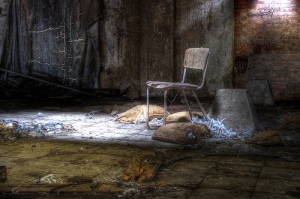I spent the first 10 years of my life in Connecticut, so when we moved to a small Southern town in the 1970’s, it was quite a culture shock. The segregation was more subtle than it had been in the 50’s, of course. We all went to school together. But we certainly didn’t live in the same neighborhoods, attend the same churches or socialize in any significant way. Every rural town has its characters, but in Apopka, Florida where I grew up, ours were even more tragic or heroic or, I suppose, both, due in part to this unofficial segregation.
Every day, rain or shine, you were bound to come across the cigarette girl. She looked like she was in her early 20’s. She was always in a ragged house dress and barefoot, summer or winter. I never saw her move, but she must have, because she popped up on various street corners throughout town, and she’d just stand there in a catatonic state, looking like an impoverished, unkempt and extremely neglected statue. The saddest thing about her was that she always had cigarette butts stuck haphazardly in amongst her corn rows. It was disgusting. It was tragic. And the fact that her family and the powers that be in the city did absolutely nothing for her, and I felt completely unequipped to do anything myself, made me feel like the world was not a safe place, and that you couldn’t count on adults at all. Whenever I saw her I was mesmerized by her, but was too afraid to approach her. I tried to find out her story, and I did hear a rumor that she had been gang raped when she was 5 years old, and hadn’t been “right in the head” since. I don’t know if that’s true or not. But I do know that the entire town seemed to be content to let her roam the streets like a stray dog, and there’s something very, very wrong with a community that’s willing to do that.
On the way home from school or the library or the drug store, we would have to drive through the poorer neighborhoods because we were extremely poor ourselves, and therefore lived on the outskirts of town. Every single day unless it was raining, we would pass this broken down shack next to the railroad tracks, and sitting out front on one of those ratty old webbed lawn chairs would be a very old, weathered man. Whenever a car would drive by, he’d wave and smile, so I called him the waving man. I knew nothing more about him. He never had anything with him. No newspaper, no radio, no book, not even a glass of sweet tea. But he never looked bored. He just sat there and waved his wrinkled old hand as if that was his calling, as if he had always been there and always would be.

(Image credit: http://www.flickriver.com/photos/tags/lreyns/interesting/ )
At the time it never occurred to me to stop and talk to him. I think I’d have been too scared because of the neighborhood or too intimidated to cross our great cultural divide. But I was always curious about him, and would have loved to know his story. He looked happy, and yet I’m amazed that shack he lived in didn’t fall down every time a train went by and rattled its already shaky foundation. I never saw him with friends or relatives, but he looked much too old to be taking care of himself. Still, he was there, day after day, smiling, waving, enduring and apparently timeless, living his life. And I would always wave back. I hope he was content and cared for by his neighbors during his last days, but I’ll never know, now.
The last time I went back to Apopka it had changed so much that I could barely find my way around. The drug store was a mere shadow of its former self. The library, once housed in a cozy corner of a strip mall, had moved on to bigger, more modern accommodations. Everything seemed bigger and more modern, in fact. My town had joined the 21st century at last. But I will always remember it as a small town that looked the other way, and maybe that was good, and maybe it wasn’t. That was just the way Apopka was.







